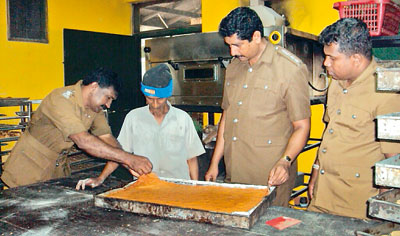News
Call for sevenfold increase in fines on dirty cafes

Checking on an eatery. Pix by S. Siriwardene
With at least 60 Colombo restaurants hauled into court last month on charges of food poisoning and lack of hygiene, city authorities are calling for sharp increases in penalties to protect customers.
Many eateries and restaurants look clean enough on the outside, but most have dirty kitchens, dirty toilets, and a vermin-infested environment alive with rats and cockroaches.
A continuous stream of complaints flow to the Ministry of Health, especially about eating places in Pettah, Wellawatte, Dehiwela, Mount Lavinia, Kollupitiya, Boralesgamuwa and Nugegoda.
The ministry is also worried about spoiled vegetables in the markets finding their way into restaurant kitchens.
A team of ministry officials raided several warehouses on 4th Cross Street, 5th Cross Street and Old Moor Street in Pettah two weeks ago and found 60 tons of rotten potatoes and 40 tons of rotten onions, which they later destroyed.
“Several eating houses and university canteens provide cheap food. The food is so cheap, because the vegetables they buy are sold cheaply,” Health Ministry’s secretary Anura Jayawickrama said. He said despite regular raids rotting vegetables are still sold.
Colombo has the highest number of recorded food poisoning cases, followed by Kurunegala and Jaffna, Colombo Municipal Council (CMC) Chief Medical Officer of Health, Dr. Ruwan Wijayamuni said, revealing that at least 60 restaurants in the capital were taken to court last month alone.
Colombo City has approximately 1,380 eating places registered with the CMC, including 479 cafes and 151 restaurants and hotels.
Dr. Wijayamuni called for stiffer fines to act as a deterrent. Under the CMC Food Act, fines currently range from Rs. 3,000-7,000, along with a possible prison sentence.
Fines should start at Rs. 10,000 and go up to Rs. 50,000, and the restaurant should lose its licence if an offence was repeated, Dr. Wijayamuni said.
Most of the food-handling work at eateries is done by unregistered day-wage earners and temporary workers a source in the Health Ministry’s Food Administration Unit said.
Under the Food Act, food handlers should undergo a medical test at least twice a year and the medical report should be certified by the area’s Medical Officer of Health.
“Due to the shortage of staff, eatery owners hire people on a temporary basis, not concerned about their health condition,” the source said..
Food poisoning can result from eating food contaminated with bacteria, viruses, toxins or parasites. Severe symptoms include frequent vomiting, vomiting of blood and/or diarrhoea lasting for more than three days, high fever, dehydration, blurred vision and weakness.

